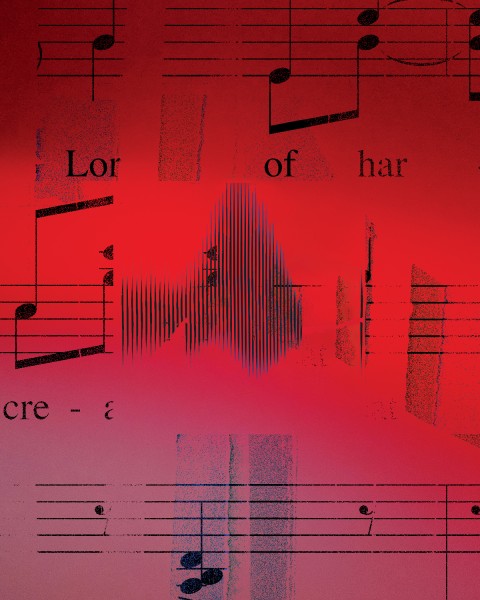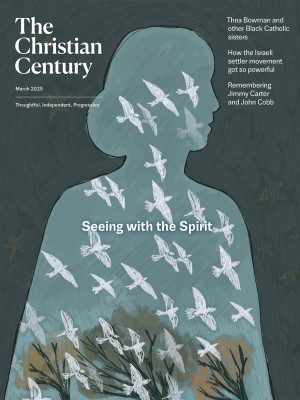I still have a voice
After the election, I was worried about people being silenced. So I joined a choir.

Century illustration
The morning after last fall’s election I awoke from a dream in tears. In the dream my voice was gradually diminishing, and soon people couldn’t hear what I was saying. I attempted to amplify my voice, but it became thinner and wispier until finally it made no sound at all. I grew increasingly frustrated, angry, and scared until I awoke, heard my own sobs, and realized that I still had a voice.
In the dream, the loss of my voice was not a metaphor; it was a physical phenomenon that I could almost feel. But in that waking moment, I was left to interpret it metaphorically and to make sense of the wisdom of the dream. It felt like foreshadowing. I’d gone to bed worried about all those who stand to lose their political voices in the coming years, worried about women’s voices and Native voices being further diminished, silenced, and ignored.
Read our latest issue or browse back issues.
Thankfully, I have places where I’m able to use my voice. I teach, preach, advocate, educate, and write for publication. But that morning I thought about my voice at a more literal level. I do not have a particularly strong voice for a public speaker, and I’ve never been trained in vocal techniques. I usually need good amplification. I speak slowly and distinctly, but my voice sounds thinner as I age. I found myself longing not just to speak and share conversation but to sing—to sing with others, to blend voices and harmonize. This desire as a response to the dream came as quite a surprise.
I sang in grade school chorus and high school church choir, but I’ve done little singing in my adult life. For many years I was a parish pastor who couldn’t juggle the commitments of attending rehearsal or singing in the choir while preaching and presiding weekly. And although I like to sing, I was never sure a church choir would have me. I sing in the car, and I sing parts of the daily office. I love to sing congregational hymns, but I sing them softly. I don’t have what I consider a great voice and probably wouldn’t withstand a choral audition.
Nonetheless the dream of losing my voice convinced me to lend my voice to a choir. This decision was intuitive—instinctual. I announced to my husband that I’d be attending choir practice at his congregation and I hoped they would have me. Two days later I spoke to the music director, who offered his welcome. Then I stepped into the lineup of altos, some of whom have sung together for 60 years.
The first night, we rehearsed two fall anthems. One spoke of gratitude and plenitude, with a melody line drawn from “Sing to the Lord of Harvest.” We were accompanied by three handbell ringers. Singing thanks and praise transformed that mood of foreboding from the dream. Attempting to blend my voice with the other singers and keep pace with the ringers helped me feel positively connected to human community, after feeling such alienation from fellow citizens on election night. I knew I was probably singing among at least one or two folks who did not vote the way I did, but choir felt like a space in which to join voices even if theological or political conversation would have to wait.
We rehearsed an Advent anthem, a variation on “O Come, O Come, Emmanuel” set to the tune of “God Rest Ye Merry Gentlemen.” It’s a lively piece that demands precise attention to key and tempo changes, with moments when the sopranos go flying up the scale while the altos and baritones stay closer to the ground. Our director was both encouraging and exacting. The rehearsal was fast-paced and fun. Afterward I felt almost euphoric, like I do after exercise or group games.
In the months since that election week I can honestly say that joining the choir is one of the best things I could have done for my spiritual health. Tuning up my voice to sing songs of praise in harmony with other humans in my community feels like a creative work of solidarity, an antidote to despair, an encouraging discourse. Choir feels like an exercise in human cooperation. No one’s voice should drown out the other, there is no insisting on one’s own way (1 Cor. 13:5), and we direct our voices to pleasant purposes (Prov. 16:24).
We’re now preparing a choral Tenebrae for Good Friday. I find myself humming the various pieces, which echo Lenten hymns and Holy Week chorales. I look forward to sitting in darkness as the readings are read and the candles are extinguished, participating in public singing and solemn liturgy, retelling a story of resistance and nonviolence and resurrection.
I have the sense that this sojourn in choir is preparing me for challenges to come. My voice is growing stronger, and its strength will be needed beyond the sanctuary.
Psalm 136 asks how to sing God’s holy song in a strange land, but the psalm emerges in exile just the same. I remember the traditions of songs sung in protest, as lament, and as resistance by those whose voices the powers seek to hush, ignore, or extinguish. When we fear losing our voices, the antidote is to know our songs and keep singing.






